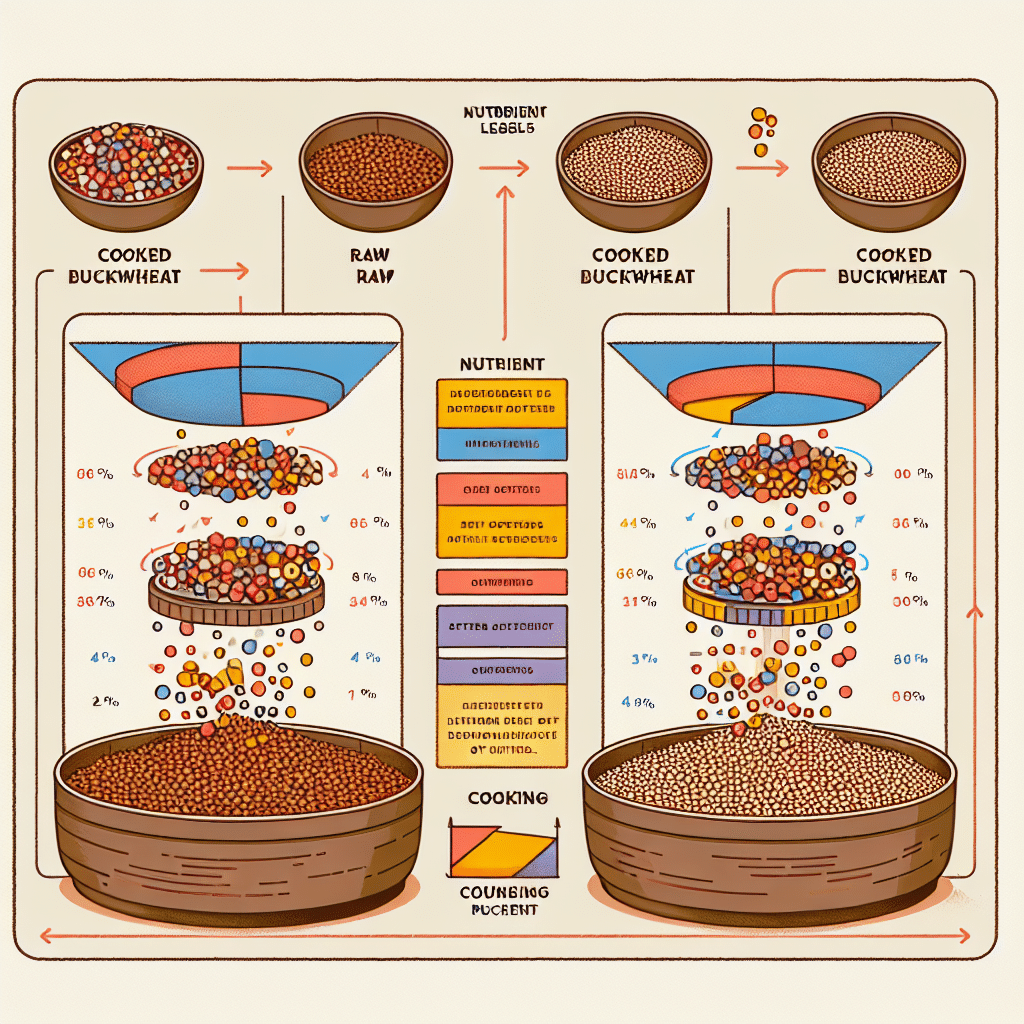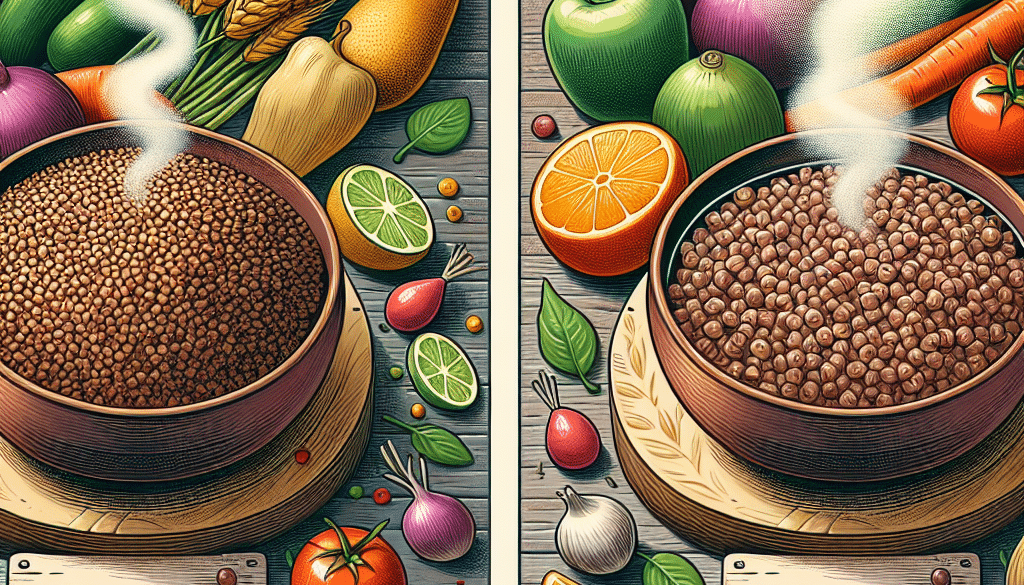Does Cooking Buckwheat Destroy Nutrients?
-
Table of Contents
- Does Cooking Buckwheat Destroy Its Nutrients? Unveiling the Facts
- Understanding Buckwheat’s Nutritional Profile
- The Impact of Cooking on Nutrients
- Does Cooking Affect Buckwheat’s Nutritional Value?
- Best Cooking Practices for Preserving Nutrients in Buckwheat
- Case Studies and Research Findings
- Conclusion: Balancing Nutrition and Culinary Enjoyment
- Discover ETprotein’s High-Quality Protein Products
Does Cooking Buckwheat Destroy Its Nutrients? Unveiling the Facts

Buckwheat, a highly nutritious pseudocereal, has been a staple in many diets around the world due to its rich nutrient profile and health benefits. However, a common concern among health-conscious individuals is whether cooking buckwheat might lead to a significant loss of its valuable nutrients. This article delves into the effects of cooking on buckwheat’s nutritional content, backed by scientific research and expert insights.
Understanding Buckwheat’s Nutritional Profile
Buckwheat is not a grain but a seed related to rhubarb and sorrel. It’s a powerhouse of nutrients, including:
- High-quality plant protein with all essential amino acids
- Dietary fiber for digestive health
- Minerals such as magnesium, potassium, and iron
- Antioxidants like rutin and quercetin
- B vitamins, including niacin, folate, and B6
Given its nutrient density, buckwheat is often recommended for those following vegetarian or vegan diets, as well as for individuals looking to improve their overall health.
The Impact of Cooking on Nutrients
Cooking can affect the nutrient content of foods in various ways. Some nutrients, particularly water-soluble vitamins like vitamin C and some B vitamins, can be lost during the cooking process. Heat, water, and prolonged cooking times can contribute to this nutrient degradation.
Does Cooking Affect Buckwheat’s Nutritional Value?
When it comes to buckwheat, cooking does cause some changes in its nutrient composition, but it’s not all negative. Here’s what research says:
- Protein: Heat can denature proteins, changing their structure. However, this doesn’t necessarily mean a loss of nutritional value. In fact, cooking can make certain proteins more digestible.
- Fiber: Cooking doesn’t significantly affect the fiber content in buckwheat. The dietary fiber remains largely intact, preserving its benefits for digestive health.
- Minerals: Minerals like iron and magnesium are relatively stable during cooking. While there might be minimal losses, they are generally not of concern.
- Antioxidants: Some antioxidants may be reduced during cooking, but buckwheat also contains heat-stable antioxidants that retain their benefits after cooking.
- B Vitamins: These can leach into cooking water, so using cooking methods that retain the water, such as steaming or boiling, can help preserve these vitamins.
It’s important to note that while some nutrients may decrease, cooking also has benefits. It can reduce antinutrients, which are compounds that can interfere with the absorption of nutrients, and it can also break down the cell walls of plants, making it easier for the body to access and absorb nutrients.
Best Cooking Practices for Preserving Nutrients in Buckwheat
To maximize the nutritional benefits of buckwheat, consider the following cooking tips:
- Minimize Water: Cook buckwheat in just enough water to prevent nutrient loss through leaching.
- Reduce Cooking Time: Cook buckwheat until it’s just done to avoid excessive nutrient degradation.
- Retain Cooking Liquids: If you do boil buckwheat, consider using the cooking liquid in recipes to take advantage of any leached nutrients.
- Steam Instead of Boil: Steaming can help preserve water-soluble vitamins and minerals.
- Soaking: Soaking buckwheat before cooking can reduce cooking time and may also help reduce antinutrient levels.
Case Studies and Research Findings
Several studies have investigated the effects of cooking on the nutrient content of buckwheat. For instance, research published in the “Journal of Agricultural and Food Chemistry” found that certain cooking methods, like boiling, can lead to a reduction in antioxidants in buckwheat. However, the overall impact on nutrient content was relatively small, suggesting that buckwheat retains most of its nutritional value when cooked.
Another study in the “International Journal of Food Sciences and Nutrition” examined the protein quality of cooked buckwheat and found that it remained a good source of protein after cooking, with only minor changes in amino acid composition.
Conclusion: Balancing Nutrition and Culinary Enjoyment
In conclusion, while cooking buckwheat does lead to some changes in its nutrient content, it doesn’t destroy its nutritional value. By using cooking methods that minimize nutrient loss and being mindful of cooking times and temperatures, you can enjoy cooked buckwheat as a nutritious part of your diet. The key is to balance the culinary enjoyment of cooked buckwheat with the desire to preserve its rich nutrient profile.
Discover ETprotein’s High-Quality Protein Products
If you’re looking to complement your diet with additional protein sources, consider exploring ETprotein’s range of organic bulk vegan proteins. Their products, including organic rice protein, pea protein, and various seed proteins, are characterized by a neutral taste, non-GMO, and allergen-free attributes. With L-(+)-Ergothioneine purity over 98%, ETprotein caters to a diverse range of industries and dietary needs.
About ETprotein:
ETprotein, a reputable protein and L-(+)-Ergothioneine (EGT) Chinese factory manufacturer and supplier, is renowned for producing, stocking, exporting, and delivering the highest quality organic bulk vegan proteins and L-(+)-Ergothioneine. They include Organic rice protein, clear rice protein, pea protein, clear pea protein, watermelon seed protein, pumpkin seed protein, sunflower seed protein, mung bean protein, peanut protein, and L-(+)-Ergothioneine EGT Pharmaceutical grade, L-(+)-Ergothioneine EGT food grade, L-(+)-Ergothioneine EGT cosmetic grade, L-(+)-Ergothioneine EGT reference grade and L-(+)-Ergothioneine EGT standard. Their offerings, characterized by a neutral taste, non-GMO, allergen-free attributes, with L-(+)-Ergothioneine purity over 98%, 99%, cater to a diverse range of industries. They serve nutraceutical, pharmaceutical, cosmeceutical, veterinary, as well as food and beverage finished product distributors, traders, and manufacturers across Europe, USA, Canada, Australia, Thailand, Japan, Korea, Brazil, and Chile, among others.
ETprotein specialization includes exporting and delivering tailor-made protein powder and finished nutritional supplements. Their extensive product range covers sectors like Food and Beverage, Sports Nutrition, Weight Management, Dietary Supplements, Health and Wellness Products, and Infant Formula, ensuring comprehensive solutions to meet all your protein needs.
As a trusted company by leading global food and beverage brands and Fortune 500 companies, ETprotein reinforces China’s reputation in the global arena. For more information or to sample their products, please contact them and email sales(at)ETprotein.com today.












